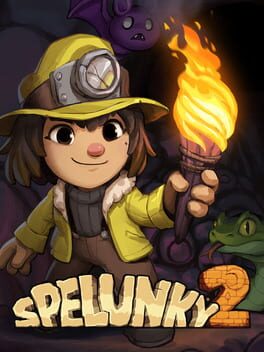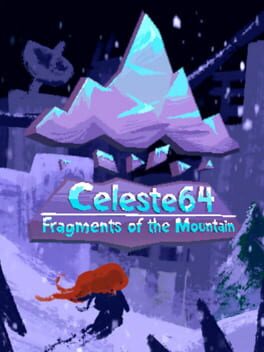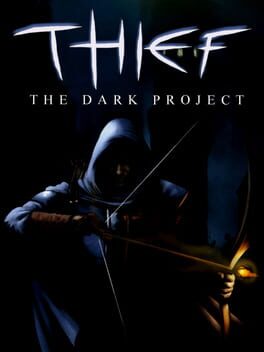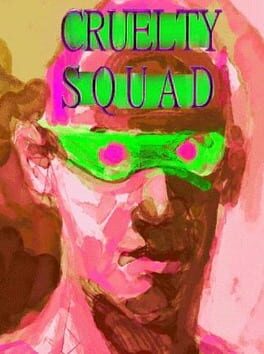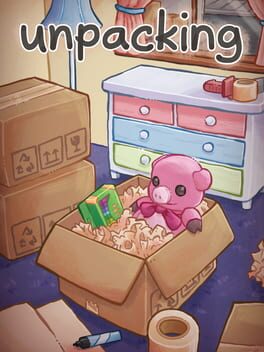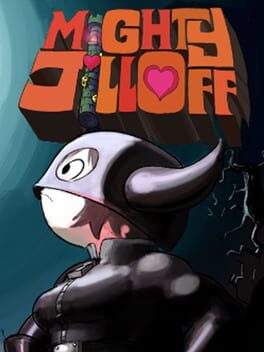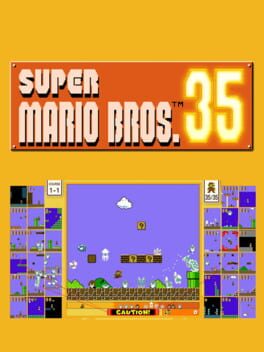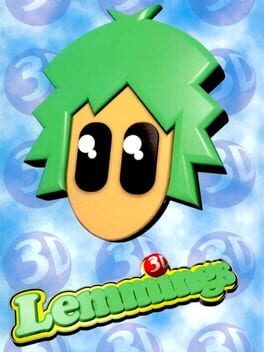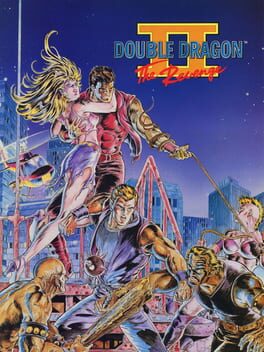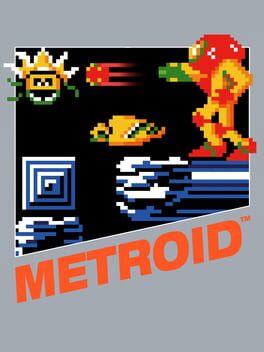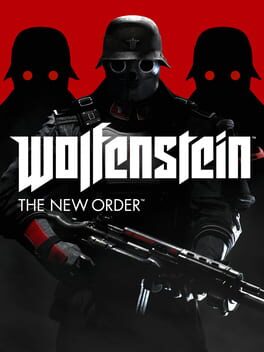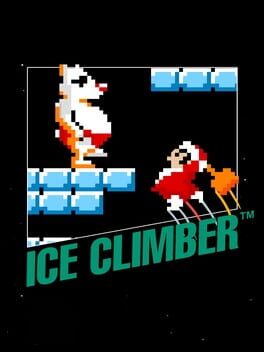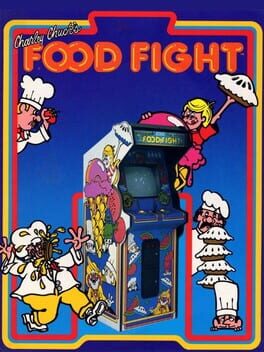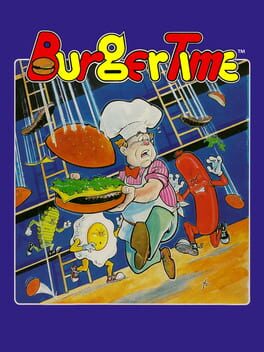Samantha_
2020
I like how every time we see Madeline she gets a bit gayer
Celeste Classic (2015): Just lil jump girl
Celeste (2018): Implied trans woman with ex boyfriend
Celeste Farewell (2019): Confirmed trans woman no partner mentioned
Celeste 64 (2024): Trans woman with girlfriend
Next time we see Madeline she better be in a 12 person lesbian polycule or else I'm not buying
Celeste Classic (2015): Just lil jump girl
Celeste (2018): Implied trans woman with ex boyfriend
Celeste Farewell (2019): Confirmed trans woman no partner mentioned
Celeste 64 (2024): Trans woman with girlfriend
Next time we see Madeline she better be in a 12 person lesbian polycule or else I'm not buying
"Not like I had a whole lot of choice, really...the rent is due...and my landlord's even tougher than the Hammers."
Groundbreaking, unique, artistically ambitious, questionably designed, and honestly a bit clunky (as all the best games are), Thief is a game I can't help but loving despite it's clear shortcomings, as it helped pave the way for many future stealth and RPG games yet remains distinct from the wave of works it led.
Now Thief is far from the first stealth game of course. Metal Gear was already a decade old when it debuted with Castle Wolfenstein even older, however it manages to distinguish itself through its unique design choices. Thief was described at the time as an FPS however not in the traditional sense, an (uncredited) Looking Glass Studios employee coined it as a 'First Person Sneaker' to both compare and distinguish it from the wildly popular First-Person shooters of the era you're certainly familiar with.
Thief is quite notable for being the first stealth game to use visibility, varying floor surfaces, and simulated light occlusion as mechanics which lends the stealth a responsive and tactile feel, building the illusion that you're exploring a real three-dimensional space. Stealth games can often have bad tendencies to create waiting simulators where you simply go between clearly marked safe spots waiting for clearly marked openings, which can lead to boring and repetitive gameplay, this however is where the gameplay excels the most. Considered a keystone title in the Immersive Sim subgenre Thief is built around gameplay emergence and the unique interactions between gameplay systems. Perhaps best expressed through the varying arrow types available, water arrows to extinguish torches (or harm fire enemies) , moss arrows to create silent walking paths (or break short falls), rope arrows to scale up buildings (or back down to escape them). Each arrow type has multiple uses in ways the player can discover as they play for unique and interesting interactions, it truly makes the levels feel like real places you're really try to sneak through. This is actually quite impressive because... somehow... Thief was originally intended to not be a stealth game at all?
Earlier versions of the game were actually intended as sword-fighting simulators (which explains the strangely detailed sword mechanics) and deep into development was when the game was actually retooled into a stealth experience, this is at first glance kind of mindblowing. Like one of the most iconic stealth games was only barely a stealth game at all? woah.... However this becomes more obvious when looking at the most clear shortcoming of the game, the level design.
I'm not exactly breaking new ground here to say that the level design in Thief can leave a lot to be hoped for. The levels feel unoptimized for stealth and often far over wear their welcome or are too obtuse to navigate. Ultimately I feel there are only 2 or 3 levels I don't have significant problems with, but I will defend that these levels as not completely irredeemable or without merit. Even largely bad levels like Down in the Bonehoard are not devoid of interesting ideas and can still bring something to the game as a whole with how it contrasts the more traditional levels. While it's still not great every level has at least something to be brought out of it and appreciate despite the rough edges. It is however far easier to appreciate what these levels do excel at, in conveying a sense of mood and atmosphere.
Thief's just.... vibe is so incredible. A unique setting blurring the lines between late Medieval and Victorian, with fantastical elements bleeding through to the surface but not overpowering to the overall setting. The world is in perpetual shadow and hardship with people scraping through life against uncaring rulers, one of the most interesting elements of Thief's story is the protagonist Garret himself. Unlike most other stealth games Garret is not an assassin, a special operative, a ninja, or the greatest secret agent who ever lived. Garret is simply a thief trying to make ends meet by robbing those so rich they would hardly notice it missing, and this provides an excellent alternative to the more traditional power fantasy elements of other stealth games.
Compared to say, Hitman, Garret is not some unstoppable force that will effortlessly take out opponents but rather one that must go great lengths to analyze situations through notes and sound cues to engineer a victory out of certain failure. As the game progress things take a more and more explicitly supernatural path it places Garret further and further out of his element. Sneaking past not guards but zombies, ghosts, and the absolutely terrifying haunts who whisper sweet nothings about burning flesh as they walk past. I especially love how the maps you use to navigate reflects the location itself, hand drawn from inside sources, floorplans, rough sketches from limited information, metaphorical markings of otherworldly locations, even ancient maps of a lost city marked by hieroglyphics all work to add an extra layer of world-building to each level and help you comprehend the spaces you explore.
Thief provides a unique narrative-aesthetic experience that remains interesting long after it's release with engaging stealth gameplay and a palpable atmosphere that remains vivid in my mind. It's the kind of game that leaves such an impression it's all you can think about until you finally watch the credits roll, there's not many games that engage me so deeply that even while making lunch the next day it keeps my full attention like this game did.
I just can't help but love this game despite (or maybe because of) the many rough edges, and I'm certainly excited to try the sequel
"The Trickster is dead, beware the dawn of the Metal Age."
Groundbreaking, unique, artistically ambitious, questionably designed, and honestly a bit clunky (as all the best games are), Thief is a game I can't help but loving despite it's clear shortcomings, as it helped pave the way for many future stealth and RPG games yet remains distinct from the wave of works it led.
Now Thief is far from the first stealth game of course. Metal Gear was already a decade old when it debuted with Castle Wolfenstein even older, however it manages to distinguish itself through its unique design choices. Thief was described at the time as an FPS however not in the traditional sense, an (uncredited) Looking Glass Studios employee coined it as a 'First Person Sneaker' to both compare and distinguish it from the wildly popular First-Person shooters of the era you're certainly familiar with.
Thief is quite notable for being the first stealth game to use visibility, varying floor surfaces, and simulated light occlusion as mechanics which lends the stealth a responsive and tactile feel, building the illusion that you're exploring a real three-dimensional space. Stealth games can often have bad tendencies to create waiting simulators where you simply go between clearly marked safe spots waiting for clearly marked openings, which can lead to boring and repetitive gameplay, this however is where the gameplay excels the most. Considered a keystone title in the Immersive Sim subgenre Thief is built around gameplay emergence and the unique interactions between gameplay systems. Perhaps best expressed through the varying arrow types available, water arrows to extinguish torches (or harm fire enemies) , moss arrows to create silent walking paths (or break short falls), rope arrows to scale up buildings (or back down to escape them). Each arrow type has multiple uses in ways the player can discover as they play for unique and interesting interactions, it truly makes the levels feel like real places you're really try to sneak through. This is actually quite impressive because... somehow... Thief was originally intended to not be a stealth game at all?
Earlier versions of the game were actually intended as sword-fighting simulators (which explains the strangely detailed sword mechanics) and deep into development was when the game was actually retooled into a stealth experience, this is at first glance kind of mindblowing. Like one of the most iconic stealth games was only barely a stealth game at all? woah.... However this becomes more obvious when looking at the most clear shortcoming of the game, the level design.
I'm not exactly breaking new ground here to say that the level design in Thief can leave a lot to be hoped for. The levels feel unoptimized for stealth and often far over wear their welcome or are too obtuse to navigate. Ultimately I feel there are only 2 or 3 levels I don't have significant problems with, but I will defend that these levels as not completely irredeemable or without merit. Even largely bad levels like Down in the Bonehoard are not devoid of interesting ideas and can still bring something to the game as a whole with how it contrasts the more traditional levels. While it's still not great every level has at least something to be brought out of it and appreciate despite the rough edges. It is however far easier to appreciate what these levels do excel at, in conveying a sense of mood and atmosphere.
Thief's just.... vibe is so incredible. A unique setting blurring the lines between late Medieval and Victorian, with fantastical elements bleeding through to the surface but not overpowering to the overall setting. The world is in perpetual shadow and hardship with people scraping through life against uncaring rulers, one of the most interesting elements of Thief's story is the protagonist Garret himself. Unlike most other stealth games Garret is not an assassin, a special operative, a ninja, or the greatest secret agent who ever lived. Garret is simply a thief trying to make ends meet by robbing those so rich they would hardly notice it missing, and this provides an excellent alternative to the more traditional power fantasy elements of other stealth games.
Compared to say, Hitman, Garret is not some unstoppable force that will effortlessly take out opponents but rather one that must go great lengths to analyze situations through notes and sound cues to engineer a victory out of certain failure. As the game progress things take a more and more explicitly supernatural path it places Garret further and further out of his element. Sneaking past not guards but zombies, ghosts, and the absolutely terrifying haunts who whisper sweet nothings about burning flesh as they walk past. I especially love how the maps you use to navigate reflects the location itself, hand drawn from inside sources, floorplans, rough sketches from limited information, metaphorical markings of otherworldly locations, even ancient maps of a lost city marked by hieroglyphics all work to add an extra layer of world-building to each level and help you comprehend the spaces you explore.
Thief provides a unique narrative-aesthetic experience that remains interesting long after it's release with engaging stealth gameplay and a palpable atmosphere that remains vivid in my mind. It's the kind of game that leaves such an impression it's all you can think about until you finally watch the credits roll, there's not many games that engage me so deeply that even while making lunch the next day it keeps my full attention like this game did.
I just can't help but love this game despite (or maybe because of) the many rough edges, and I'm certainly excited to try the sequel
"The Trickster is dead, beware the dawn of the Metal Age."
2021
How do you review cruelty squad?
What even is there to say about a game so seemingly uncaring of it's outward perception?
In a literal sense Cruelty Squad is an anti-capitalist immersive sim set in a latest-stage corporatocracy where the cryptobros won and you're forced speculatively gamble on human organs as a side-hustle to cover you rent. That is an explanation of what cruelty squad is and you could just play it as such, enjoying the intricately designed 3D environments and gameplay, but that doesn't really capture the anger that cruelty squad conveys.
A viscous hatred towards the gig-economy manifested in the barest form holding no pretense of what makes acceptable art, compressed by a global pandemic and subsequent lockdown into a barely palatable expression of discontent and trauma with the systems that dictate our lives. I keep coming back to this game every few months because I am so enamored with it, maybe a way to relive that moment of fear and isolation when the world felt like it was closing in, or a means of catharsis against the political and economic realities the game reflects. I'm not sure, but when playing cruelty squad I can't help but feel it understands the uneasiness in the world, and that is an emotional reaction I feel for few other pieces of media
What even is there to say about a game so seemingly uncaring of it's outward perception?
In a literal sense Cruelty Squad is an anti-capitalist immersive sim set in a latest-stage corporatocracy where the cryptobros won and you're forced speculatively gamble on human organs as a side-hustle to cover you rent. That is an explanation of what cruelty squad is and you could just play it as such, enjoying the intricately designed 3D environments and gameplay, but that doesn't really capture the anger that cruelty squad conveys.
A viscous hatred towards the gig-economy manifested in the barest form holding no pretense of what makes acceptable art, compressed by a global pandemic and subsequent lockdown into a barely palatable expression of discontent and trauma with the systems that dictate our lives. I keep coming back to this game every few months because I am so enamored with it, maybe a way to relive that moment of fear and isolation when the world felt like it was closing in, or a means of catharsis against the political and economic realities the game reflects. I'm not sure, but when playing cruelty squad I can't help but feel it understands the uneasiness in the world, and that is an emotional reaction I feel for few other pieces of media
2021
Unpacking is a game I feel like I should apologize about not caring for in the way it clearly wanted me to.
Opening boxes and sorting out keepsakes, appreciating the music and pixel art, is a nice and cozy experience at times but the game often sabotages it's own strengths with it's over-gamification. The ways it forces you to cram too many things into too small a space crushes the room design aspects into a more puzzle oriented experience rather than the home designer it appears at first glace. This doesn't sound too bad on paper as puzzle games can be engaging in their own ways, but it gets amplified by the game's biggest problem of limiting you to placing objects in specific spaces rather than letting you design freely. It confuses me why they insist on an idea that seems so counter to the game's story and vibe, but ultimately every level becomes a chore of looking around and seeing what the game has declared to be an 'incorrect' placement of items and cramming them in the right cupboards it allows you.
Would it not make more sense to let me design as I please? Isn't designing a room not what I'm supposed to be doing? This also opens the door to a lot of cultural translation problems where I personally don't recognize what certain items are, but not only is there no option not to place them it also reprimands me for putting them in the wrong places until I eventually toss them into the correct cabinet by guesswork. I don't want to discredit the ways this is used purposefully to nice effect, journals hidden under pillows, photos too hurtful to be put on the wall, it's all nice and had me smiling at times but I can't help but feel these moments could be kept with a less strict system.
Now the story is seemingly what the game is focused on the most, and while watching which items are brought along and which are left behind adds more engagement to the unpacking, what's here ultimately feels barebones. It's a pretty standard story of growing up, moving out, and finding love, and it feels uninterested in anything beyond absolute convention (besides the main character being a lesbian) and I'm just left wishing for more.
That really summarizes my entire feelings on this game, I'm left wishing for more. More freedom in designing cozy spaces, more cozy atmosphere free of unnecessary puzzle mechanics, and more cute story moments to track along as I unpack the memories. This is a game that was seemingly made for me but at every moment I felt like I was unpacking somebody else's story, and reprimanded for expressing it in a way not seen fit.
Opening boxes and sorting out keepsakes, appreciating the music and pixel art, is a nice and cozy experience at times but the game often sabotages it's own strengths with it's over-gamification. The ways it forces you to cram too many things into too small a space crushes the room design aspects into a more puzzle oriented experience rather than the home designer it appears at first glace. This doesn't sound too bad on paper as puzzle games can be engaging in their own ways, but it gets amplified by the game's biggest problem of limiting you to placing objects in specific spaces rather than letting you design freely. It confuses me why they insist on an idea that seems so counter to the game's story and vibe, but ultimately every level becomes a chore of looking around and seeing what the game has declared to be an 'incorrect' placement of items and cramming them in the right cupboards it allows you.
Would it not make more sense to let me design as I please? Isn't designing a room not what I'm supposed to be doing? This also opens the door to a lot of cultural translation problems where I personally don't recognize what certain items are, but not only is there no option not to place them it also reprimands me for putting them in the wrong places until I eventually toss them into the correct cabinet by guesswork. I don't want to discredit the ways this is used purposefully to nice effect, journals hidden under pillows, photos too hurtful to be put on the wall, it's all nice and had me smiling at times but I can't help but feel these moments could be kept with a less strict system.
Now the story is seemingly what the game is focused on the most, and while watching which items are brought along and which are left behind adds more engagement to the unpacking, what's here ultimately feels barebones. It's a pretty standard story of growing up, moving out, and finding love, and it feels uninterested in anything beyond absolute convention (besides the main character being a lesbian) and I'm just left wishing for more.
That really summarizes my entire feelings on this game, I'm left wishing for more. More freedom in designing cozy spaces, more cozy atmosphere free of unnecessary puzzle mechanics, and more cute story moments to track along as I unpack the memories. This is a game that was seemingly made for me but at every moment I felt like I was unpacking somebody else's story, and reprimanded for expressing it in a way not seen fit.
2008
2009
Approaching this game as somebody who played the PS5 remake as my first version, and first souls game for that matter, I will say this version is clearly superior, and not by an insignificant amount.
It's hard to believe a console action RPG from 15 years ago can still feel so fresh, innovative, and genuinely experimental; though some is for the best and some is for the... Dragon God. Playing in the original aesthetic context compared to the bluepoint version makes areas such as the Tower of Latria and Valley of Defilement much more clear to their intentions and far easier to appreciate the change in gameplay style.
The PS3 sheen and incredible art direction bring such a sense of magic to the world, every area holds such a distinct visual presence only amplified beautifully with the haunting music. Definitely the best of the Souls games, it's a shame this was a more modest success compared to the massive runaway hit of Dark Souls, one of the most beautiful worlds of any video game, hopeless and bleak only briefly broken up by the (weirdly British) voices of those you encounter on your path.
Please give this game a try, it's far more than just a trial run for Dark Souls and holds so many unique ideas and strange quirks it will likely keep that experimental edge for even further years past it's release.
What a truly special game.
It's hard to believe a console action RPG from 15 years ago can still feel so fresh, innovative, and genuinely experimental; though some is for the best and some is for the... Dragon God. Playing in the original aesthetic context compared to the bluepoint version makes areas such as the Tower of Latria and Valley of Defilement much more clear to their intentions and far easier to appreciate the change in gameplay style.
The PS3 sheen and incredible art direction bring such a sense of magic to the world, every area holds such a distinct visual presence only amplified beautifully with the haunting music. Definitely the best of the Souls games, it's a shame this was a more modest success compared to the massive runaway hit of Dark Souls, one of the most beautiful worlds of any video game, hopeless and bleak only briefly broken up by the (weirdly British) voices of those you encounter on your path.
Please give this game a try, it's far more than just a trial run for Dark Souls and holds so many unique ideas and strange quirks it will likely keep that experimental edge for even further years past it's release.
What a truly special game.
2020
1995
who wrote this description ??
"On the NES, Double Dragon II is a much more innovative and unique sequel than in the arcade, but it marks also the time Double Dragon started its schizophrenic shifting between wildly different tones and gameplay styles. In a way it’s one of the best games to bear the Double Dragon name, but it’s hard to shake the feeling that Technōs had already started to loose a cohesive vision of what it meant to be Double Dragon, both in tone and in gameplay."
why do people see an IGDB description box and paste in their 8 hour video essay script like calm down
"On the NES, Double Dragon II is a much more innovative and unique sequel than in the arcade, but it marks also the time Double Dragon started its schizophrenic shifting between wildly different tones and gameplay styles. In a way it’s one of the best games to bear the Double Dragon name, but it’s hard to shake the feeling that Technōs had already started to loose a cohesive vision of what it meant to be Double Dragon, both in tone and in gameplay."
why do people see an IGDB description box and paste in their 8 hour video essay script like calm down
1986
1985
1983
1982
